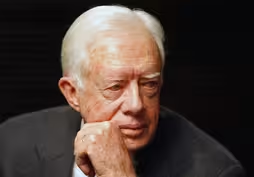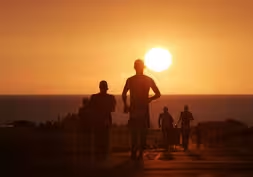
A Brief But Spectacular take on loving what you play
Clip: 1/1/2025 | 4m 29sVideo has Closed Captions
Renowned pianist Lang Lang's Brief But Spectacular take on loving what you play
Lang Lang, one of the world's most famous classical pianists, discovered his passion for piano while growing up alongside other musicians in China. Today, he stands as a globally acclaimed classical pianist whose extraordinary talent has led him to perform with diverse musical legends. He shares his Brief But Spectacular take on loving what you play.
Problems playing video? | Closed Captioning Feedback
Problems playing video? | Closed Captioning Feedback
Major corporate funding for the PBS News Hour is provided by BDO, BNSF, Consumer Cellular, American Cruise Lines, and Raymond James. Funding for the PBS NewsHour Weekend is provided by...

A Brief But Spectacular take on loving what you play
Clip: 1/1/2025 | 4m 29sVideo has Closed Captions
Lang Lang, one of the world's most famous classical pianists, discovered his passion for piano while growing up alongside other musicians in China. Today, he stands as a globally acclaimed classical pianist whose extraordinary talent has led him to perform with diverse musical legends. He shares his Brief But Spectacular take on loving what you play.
Problems playing video? | Closed Captioning Feedback
How to Watch PBS News Hour
PBS News Hour is available to stream on pbs.org and the free PBS App, available on iPhone, Apple TV, Android TV, Android smartphones, Amazon Fire TV, Amazon Fire Tablet, Roku, Samsung Smart TV, and Vizio.
Providing Support for PBS.org
Learn Moreabout PBS online sponsorshipLAURA BARRON-LOPEZ: One of the world's most famous classical pianists, Lang Lang, discovered his passion for piano while growing up alongside other musicians in China.
His extraordinary talent has led him to perform with diverse musical legends, from the prestigious Philadelphia Orchestra to contemporary icons like Coldplay and Metallica.
Tonight, he shares his Brief But Spectacular take on loving what you play.
LANG LANG, Classical Pianist: The first few years of studying piano, I would say, it was more like having a little toy in my hand.
So, I was 2.5 when I started.
The first piece was moving my heart was "The Nutcracker" by Tchaikovsky.
I really loved it, the... (SINGING) LANG LANG: So I grew up in China, Shenyang, which is the northeast region, and it's a very industrial city, big factories.
And every day, I hear music from everywhere.
It was a very musical neighborhood.
It was a dorm of a Chinese traditional orchestra, which my father was the principal erhu player, Chinese violin.It's two strings only, like chopstick.
I was in Beijing at the age of 9, and I got fired by the piano teacher there in the conservatory.
She was kind of very skeptical of my piano style.
And that was very, very difficult for me.
I thought my piano career is over.
So, when I was 17 years old, I had this big dream to play with the biggest orchestra in America.
But in the reality, I always play as a sub, waiting for somebody to get sick.
You have to be ready all the time, and because the opportunity comes in very fast.
And if you catch it in the right way, you are in a game.
So it was a Chicago Symphony at Ravinia Festival with Christoph Eschenbach, the conductor.
The wonderful pianist Andre Watts got sick.
That was the biggest concert this summer.
When I was a kid, people sometimes called me as a prodigy.
But, of course, now I'm 41.
It's far from that age.
Sometimes, the child prodigy remains child, but the prodigy went away.
So, the important thing is to keep the talent, but let the child go away.
For me, transformation is quite an important element of a performance.
I'm always trying to move my heart into somewhere and then take my audience with me.
I think my music-making has changed a bit since I got married, having a little kid.
Sometimes, it's challenging.
I don't know whether I should be a little bit more strict or a little bit more relaxed on his education.
I'm not so sure in this moment.
And -- but he's certainly makes my playing more subtle, more sensitive.
When we play piano, every note needs to have real life, real emotions.
The hard thing to do is, what is behind the note?
What's the meaning behind the bars, rather than just play everything right.
What's the whole story and what's the background of this piece?
What is the precise -- the technique behind all those virtuosic passages?
My name is Lang Lang, and this is my Brief But Spectacular take on loving what you play.
Death toll rises in New Orleans after New Year's Day attack
Video has Closed Captions
Clip: 1/1/2025 | 7m 58s | New Year's celebrations turn to horror as death toll rises in New Orleans attack (7m 58s)
Examining Jimmy Carter's global health legacy
Video has Closed Captions
Clip: 1/1/2025 | 6m 53s | Jimmy Carter’s work promoting global public health remembered as core piece of his legacy (6m 53s)
Examining possible security lapses in New Orleans attack
Video has Closed Captions
Clip: 1/1/2025 | 6m 8s | Examining possible security lapses in New Orleans attack (6m 8s)
How exercise may be the best medical intervention ever known
Video has Closed Captions
Clip: 1/1/2025 | 7m 35s | How exercise may be the ‘most potent medical intervention ever known' (7m 35s)
Legal challenges delay result for North Carolina court
Video has Closed Captions
Clip: 1/1/2025 | 5m 51s | Legal challenges delay election result for North Carolina Supreme Court seat (5m 51s)
Providing Support for PBS.org
Learn Moreabout PBS online sponsorship
- News and Public Affairs

FRONTLINE is investigative journalism that questions, explains and changes our world.

- News and Public Affairs

Amanpour and Company features conversations with leaders and decision makers.












Support for PBS provided by:
Major corporate funding for the PBS News Hour is provided by BDO, BNSF, Consumer Cellular, American Cruise Lines, and Raymond James. Funding for the PBS NewsHour Weekend is provided by...




